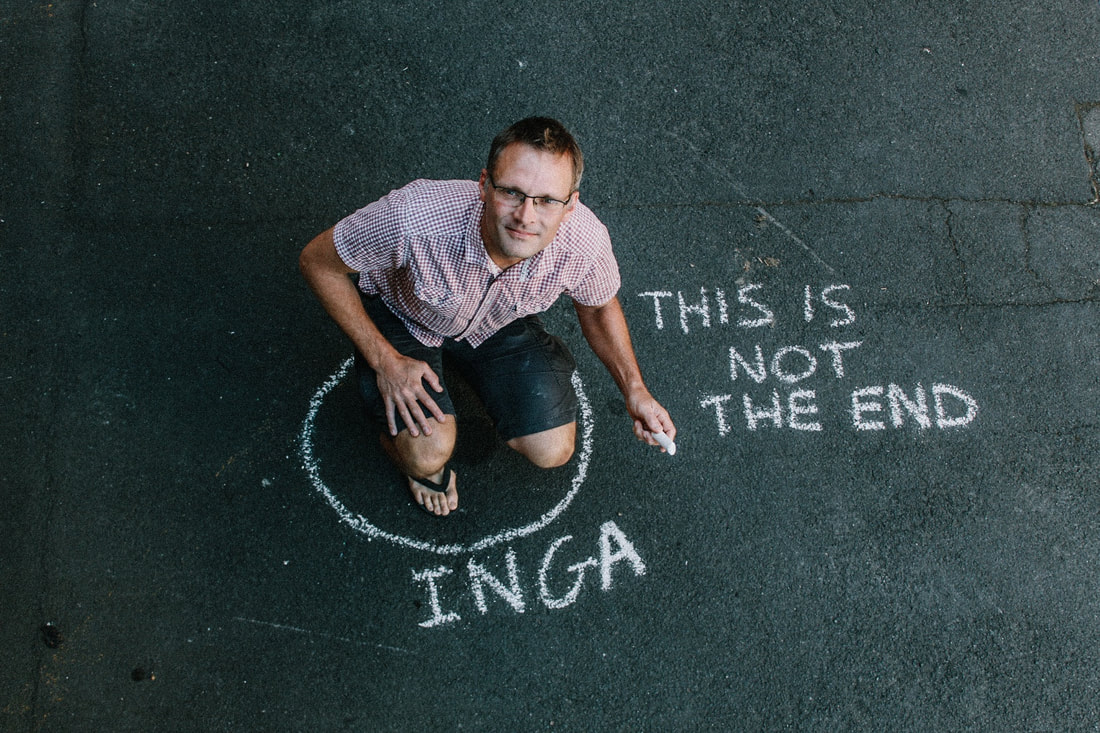Sean Burnett Dugdale-Martin
Coming into BATS Theatre’s The Dome stage, Falstie-Jensen welcomes us in with an instruction: take a piece of chalk and write your name anywhere at the front of the stage. And so we begin the show already being able to see our mark on it and are invested in what the performer has planned for our names. The program reveals the work was inspired by Falstie-Jensen’s own grandmother on the other side of the world during the first lockdown in 2020, by his daughter Clara and her friend Runman’s chalk drawings on the road, and by not thinking he would be able to tour the show because of the pandemic.
The show begins with Falstie-Jensen describing to us his 95 year-old grandmother's apartment in Denmark, methodically drawing a map of the apartment in chalk on the stage floor. Falstie-Jensen then sets himself up as a conduit for his grandmother, and how she can speak to us through him from her home on the other side of the world. Falstie-Jensen speaks softly and is magnetic in his warmth to the audience. The more Falstie-Jensen talks, the more he adds to his map, evolving into more of a tapestry with each addition. Constantly more complex but intricately familiar to those of us who have stuck around, it’s a satisfying sense of watching the show unfold in a measurable visual medium. He layers each section of the piece on top of the last with a variety of different coloured chalks as he dictates us through it: a coffee table becomes a window down onto Earth becomes Yggdrasil, The World Tree.
Falstie-Jensen now employs the BATS house tech to help him draw lines from our chalked names to the root of the World Tree. As an audience, we see our mark become entwined with everyone else's in the room. Audiences seem pretty thin these days, with venues having reduced capacities, people in self-imposed lockdowns, not wanting to risk going to live events. It’s easy to think there’s not that many people in The Dome tonight. What Falstie-Jensen orchestrates here is the mass of connections we have in this room, regardless of capacity. All of our individual names become a thick, tangled knot at the root of the Tree of All Things.
In the program, it also revealed that the show is designed for any local artists to perform it in any place they could, it only takes chalk and a voice. This style of performance speaks to the team behind the work believing that human connection is more important than the potential profit one person could make from it. It’s been performed in driveways, amphitheatres, backyards, gardens, Auckland's Aotea Centre, and school gyms. Last year, Salesi Le’ota performed the show as part of the Tahi Festival when Falstie-Jensen couldn’t make it because of Alert Levels, and other performers of the work include Alison Bruce, Phil Vaughan, Margaret-Mary Hollins and Ngahiriwa Rauhina. It’s in this deliberate accessibility that this show finds it’s heart, to be performed by anybody for anybody, anywhere. The show has had heaps of development and many seasons which, to me, means that the next step for the show could be training a cohort of performers and having each one going into a different area to perform it in. There’s a disparity between how much theatre the cities get in this country than rural Aotearoa, and this show is designed to go anywhere so it would be satisfying to see it happen more.
In terms of how the show handles the story of COVID-19, it is unburdening because the perspective, at least to me, is a fresh one. I’ve heard heaps about COVID and what it is and how many people are getting it, but I'd never heard actual testimonies about what it feels like to have the pandemic. Falstie-Jensen also speaks about his grandmother's daily routines of going out, seeing friends, doing this errand on this day and that event on that day, and how that marks the passage of time for her. Because of the lockdown, however, it is hard to know how much time has passed. Falstie-Jensen saves these moments from becoming dark by staying strong to the heart of the show and emphasising human connection. Us just trying to do our best in a world we share, calling others to check in, doing essential work.
Falstie-Jensen and dramaturg Simon O’Connor have created a show which is optimistic of the power people have in helping each other simply by connecting to them. I leave the theatre bubbly, hopeful, and wanting to call old friends.
Back To Square One? is a part of the 2022 Fringe Festival and is on until Saturday 26th Feb at BATS theatre. Find your tickets here.






